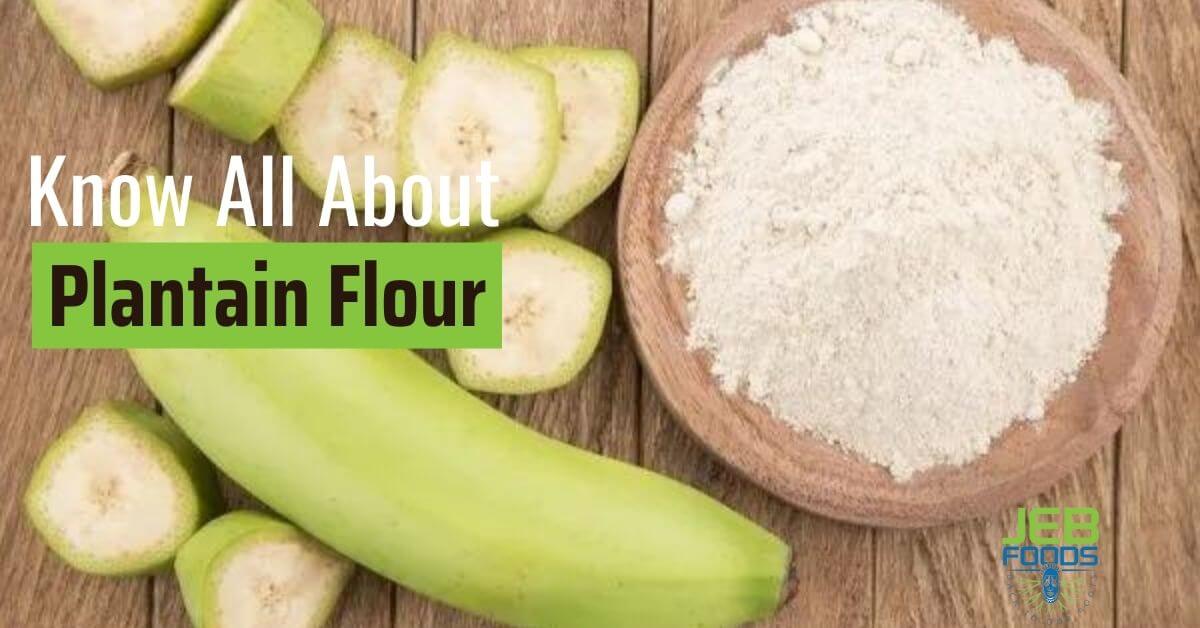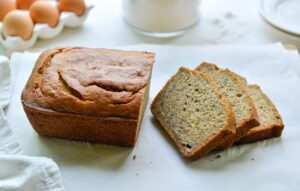Flour is a critical ingredient in Baking, and as a baker, I will be comparing Cassava flour vs Wheat flour in a head-to-head battle and which one should be preferred.
There are different types of baking flours, like wheat flour, cassava flour, tapioca flour, Almond flour, Oat flour, all-purpose flour etc.
Flour is an essential ingredient for all bakers used for baking bread, pancakes, Pasta and more. It can be used to thicken sauces, create a roux, and coat foods like fried chicken or cutlets.
Cassava Flour In Comparison With Wheat Flour
Table of Contents
ToggleCassava flour, known as a root vegetable, comes from oblong tubers underground that have a bark-like brown skin and white flesh made by grating and drying the fibrous cassava root while
Wheat flour, known as a grain, is made by taking the wheat berry, removing the bran or outer shell and grinding the seed into a flour-like consistency.
Both Cassava flour and wheat flour are essential ingredients in bread, cakes, cookies, and most baked goods.
Now let’s dive into the details of cassava flour vs wheat flour, and I will give my humble suggestion explaining the strength and weaknesses of each type of flour to help you choose the best for your Baking.
See the 15 most asked questions about Cassava flour here
Wheat Flour Gluten In Comparison With Cassava Flour
The proteins present in wheat, rye, and barley, are referred to as Gluten whereas cassava flour is gluten-free.
It functions as a glue in wheat, allowing foods to stick together and keep their form. Gluten is commonly found in bread, cereal, pastries, fried meals, and a range of processed goods manufactured from wheat flour.
But most people do not like gluten meals because If you have this auto-immune digestive disease, gluten can damage your small intestine and impair your body’s ability to absorb essential nutrients.
Gluten intolerance can cause problems with your digestive system. Symptoms such as stomach discomfort, bloating, diarrhea, and anemia are possible.
Cassava flour, on the other hand, is gluten-free. It contains much resistant starch, which is a form of starch that bypasses digestion and has characteristics comparable to soluble fiber.
Consuming meals high in resistant starch may offer several health advantages.
Resistant starch feeds the good bacteria in your stomach, which may reduce inflammation and promote digestive health.
Resistant starch has fewer calories than typical starch and is gluten-free, making it an excellent alternative for Baking.
How Does Cassava Flour Compare To Wheat Flour In Terms Of Nutrients
Cassava flour most common usage, at least in the United States, is as a wheat substitute. Let’s see how to compare the nutrients in cassava flour to whole wheat flour.
According to USDA statistics, whole wheat flour has more nutrients, including protein, fat, fiber, B vitamins, and minerals.
100 grams of whole wheat flour contains 39 percent of the RDA for magnesium, 41 percent of the RDA for thiamin, 31 percent of the RDA for vitamin B6, 31 percent of the RDA for niacin, and 13 percent of the RDA for iron. RDA percentages may differ according on age, gender, and lactation/pregnancy.
Because the USDA only gives nutrients for raw cassava, which is not comparable, the data below includes values in commonly recommended Jeb Foods Cassava Flour.
Nutrients in Jeb Foods Cassava Flour vs. Whole Wheat Flour, per 100 grams
Serving Size 20g cassava flour
5 Servings per 100 g
0.8 Servings per 1/8 cup (30ml – 15.5g)
| Energy per 20g serving : | Cassava flour | Wheat flour |
| Calories / Kilocalories | 71.6 Cal / kcal | 406.8 |
| Nutrients : | Per 1/8 cup (30ml) | |
| Energy | 231.7kJ (55.4Cal) | |
| Protein | 0.03g | 16.44g |
| Fat Total | 0.003g | 2.24g |
| – saturated | 0.001g | |
| – trans fat | 0g | |
| – polyunsaturated fat | 0.001g | |
| – monounsaturated fat | 0.001g | |
| Cholesterol | 0 mg | |
| Total Carbohydrate | 13.72g | 87.08g |
| Sugars | 0.52g | 0.49g |
| Water | 1.7g | |
| Ash | 0.02g | |
| Dietary Fiber | 0.1g | 14.64g |
| Selenium, Se | 0.1 µg (microgram) | |
| Sodium, Na | 0.18 mg | 6mg |
| Potassium, K | 2 mg | 486mg |
| Magnesium, Mg | 0.18 mg | 165.6mg |
| Phosphorus, P | 1 mg | 415.2mg |
| Zinc, Zn | 0.02 mg | 3.52mg |
| Calcium, Ca | 3 mg | 40.8mg |
| Iron, Fe | 0.24 mg | 4.66mg |
| Copper, Cu | 0.003 mg | 0.46mg |
| Manganese, Mn | 0.017 mg | |
| Vitamin C – ascorbic acid | 0 mg | |
| Vitamin B6 | 0.001 mg | |
| Foliate – total | 1 µg (microgram) | |
| Choline – total | 0.2 mg | |
| Pantothenic acid | 0.021 mg | |
| Aspartic acid | 0.002 mg | |
| Glutamic acid | 0.004 mg | |
| Selenium, Se (mcg) | 84.84mg | |
| Vitamin A, IU (IU) | 10.8IU | |
| Retinol (mcg) | 0 | |
| Carotene, beta (mcg) | 6mcg | |
| Carotene, alpha (mcg) | 0 | |
| Vitamin E (alpha-tocopherol) (mg) | 0.98mg | |
| Cryptoxanthin, beta (mcg) | 0 | |
| Lycopene (mcg) | 0 | |
| Lutein + zeaxanthin (mcg) | 264mg | |
| Vitamin C, total ascorbic acid (mg) | 42.4 mg | 0 |
| Thiamin (mg) | 0.087 mg | 0.54 |
| Riboflavin (mg) | 0.048 mg | 0.26 |
| Niacin (mg) | 0.854 mg | 7.64 |
| Pantothenic acid (mg) | 1.21 | |
| Vitamin B-6 (mg) | 0.41 | |
| Folate, total (mcg) | 52.8 | |
| Vitamin B-12 (mcg) | 0 |
*These Percent Daily Values are based on a 2,000 calorie diet, so your values may change depending on your calorie needs.
Cassava flour has a low-fat level when compared to other gluten-free flours such as coconut or almond. It contains more water and lower calorie density than flours such as corn, plantain, rice, coconut, sorghum, and wheat.
Cassava flour is best used with other nutrient-dense meals to increase fiber, vitamins, and minerals.

How Does Cassava Flour Compare In Toxicity To Wheat Flour
Wheat flour contains gluten which makes it toxic, especially to gluten-sensitive people. When exposed to gluten, those with gluten sensitivity may have the same symptoms as individuals with celiac disease.
Some individuals think gluten might cause additional health problems such as attention deficit hyperactivity disorder (ADHD), autism, headaches, depression, weight gain, and more.
Now to cassava flour: Cassava root contains cyanide which makes it toxic if not adequately prepared and may increase your risk of developing health complications.
But the good news is that cassava flour is well processed and free from toxins or any other harmful compound and certified as a non-GMO product, grain-free and gluten-free, making it safe to use without any precooking.
Research has also shown that cassava flour can be a healthier choice when taken in the right proportion for diabetics than other starches because of its relatively low glycemic index.
Read More about the Number one reason you should avoid gluten
How Does Cassava Flour Compare In Calories To Wheat Flour
Cassava flour contains 456 calories in a cup (120g) serving. 7.2 from fat while there are 408 calories in a 1 cup (120.000g) serving size of Wheat flour, whole-grain. The calorie breakdown is 7% fat, 85% carbs, and 16% protein.
So you may ask, what is the recommended daily intake of calories I should consider when using cassava flour?
The optimum daily calorie intake varies according to age, metabolism, and amount of physical activity, among other factors. Women are recommended to consume 2,000 calories per day, and men are recommended to consume 2,500 calories daily.
Ensuring the energy you consume into your body with the energy you use is an essential element of a balanced diet; those who engage in a lot of physical activity will benefit from the calories in cassava flour.
Limiting your calorie intake to 500 fewer calories than your body needs to maintain your present weight is a typical rule of thumb, indicating that you must generate a calorie deficit to lose weight.
The calories you eat is used by your body to fuel your basal metabolic rate (BMR), digestion, and physical activity. Your weight will continue instability if you consume the same number of calories that you burn, and so on.
A healthy diet includes balancing the energy you feed into your body with the energy you utilize.
How Does Cassava Flour Compare In Benefits To Wheat Flour
Based on health and nutritional content, wheat is one of the most adaptable grains. It offers several health advantages, including the control of obesity, the improvement of your body’s metabolism, and the prevention of type 2 diabetes.
It also aids in preventing infantile asthma, protecting the body from coronary illnesses, relieve postmenopausal symptoms, and avoid heart attacks.
Wheat is not advisable for people who are prone to allergy responses since it might worsen them. Eczema, itching, hives, and rashes can result from this.
Wheat is likewise high in oxalates, so don’t consume too much of it. Too much oxalates in your blood can cause various issues, including kidney stones, gallstones, and gout.
Wheat flour is highly contentious because it includes gluten, a protein that can provoke an auto-immune response in people susceptible to it.
Now to cassava flour which is grain-free, gluten-free and dairy-free, this makes it a perfect substitute for grain flours in Baking.
Cassava flour contains resistant starch, which functions similarly to dietary fiber. These move from the small intestines directly to the colon, where fermentation starts, improving gut health by feeding the good gut bacteria.
If you’re watching your weight, cassava is a good option because it’s typically lower in calories than other flour options. Eating resistant starch primarily found in cassava flour can help people feel fuller.
Despite cassava flour’s limited protein nutrient compared to wheat flour, it’s very beneficial in limiting the risk of health complications.
How Does Cassava Flour Compare In Water Absorption To Wheat Flour
Water absorption refers to the amount of water absorbed by flour to obtain the correct consistency and produce a high-quality end product. It is the optimal amount of water you can add to a dough before it becomes too sticky to process.
Water absorption influences the following parameters of Baking and bread:
- Loaf volume
- Fracture stress of bread crumb
- Bread yield
- Machinability
- Proofing
- Final products attributes
It is usually defined by flour weight.
For example, 60% water absorption means 60 lbs of water is used to hydrate 100 lbs of flour, which means that the best flour based on water absorption is Cassava flour.
It has the highest water absorption capacity of 221.8%, while wheat flour has the least at 31.9%.
How Does Cassava Flour Compare In Grain-Free To Wheat Flour
Cassava flour is grain-free, while wheat flour is not.
A grain-free diet eliminates all grains, including wheat, spelt, barley, rye, dried corn, millet, rice, oats, and foods — and sometimes even ingredients — derived from them.
How Does Cassava Flour Compare In Usability To Wheat Flour
When baking with wheat flour, it’s important to not dive into a regular recipe and replace regular flour with whole wheat. There are definite texture and flavor differences.
It’s safe to replace half of the all-purpose flour with whole-wheat in most recipes.
Whole grain wheat flour can be used alone. However, the loaves are heavier and denser but have an excellent flavor.
While cassava flour may typically be substituted for wheat flour and all-purpose flour in a 1:1 ratio, it is not ideal for every recipe.
Cassava flour has a similar consistency to all-purpose flour, but it absorbs more water, making it a favored alternative.
In addition, Cassava flour is a perfect fit as a substitute for most wheat flour recipes if you understand the mix ratio for each recipe. Cassava flour is lighter than all-purpose flour (130 g per cup vs 145 to 150 g using the scoop and sweep technique), but it absorbs more moisture than wheat flour.
As a result, a person may need to use slightly less cassava flour in a dish than ordinary wheat flour. To get the proper balance, you must experiment a little.
Final thoughts
Cassava Flour Vs Wheat Flour is majorly different by the gluten present in wheat, which is what we all should stay away from.
Gluten-free diets have grown in popularity in recent years, particularly among those who suffer from digestive difficulties and are aware of gluten’s effects on their bodies.
If you’re considering whether to become gluten-free, it’s thought that eliminating gluten helps manage medical issues and adds to a better diet.
Cassava flour might replace between 20% and 30% of the wheat flour customarily used to create bread without appreciably changing its sensory qualities or hindering the leavening process that causes the dough to rise.
“Above the 30% limit, the look, texture, and taste of bread prepared with a blend of wheat and cassava flour begin to differ from bread made with wheat flour alone.”
So if you do not want gluten in your meal, please stay away from wheat flour and other gluten-based flour. But if you desire an excellent baking experience with a flour that is grain-free, gluten-free, nut-free with paleo and vegan compliance, then pick up the Jeb Foods Cassava Flour.





